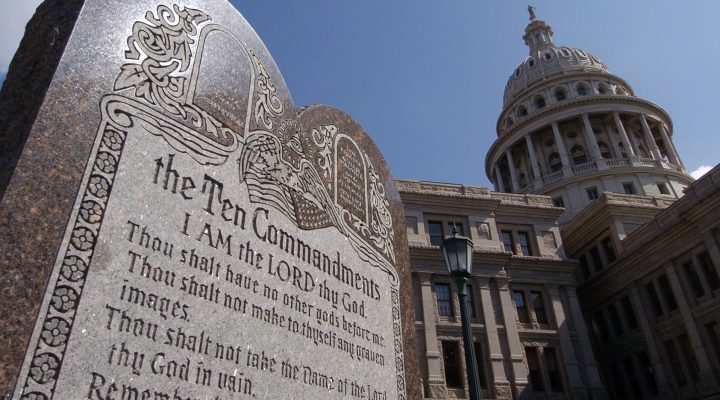Legislation that would require posting the Ten Commandments in every Texas public school classroom has gone largely unnoticed nationally, but it hasn’t gone unnoticed by the Baptist Joint Committee for Religious Liberty, its leaders said recently.
Senate Bill 1515 “hasn’t gotten a lot of attention so far because it’s still in process in front of the Texas Legislature. But it certainly got our attention as a particularly bad idea and brazen attempt by a legislature to push forward a religious agenda as soon as they had a crack in the (U.S. Supreme) Court’s Establishment Clause jurisprudence,” BJC General Counsel Holly Hollman said during the May 4 episode of the “Respecting Religion” podcast.

Holly Hollman
The shift in how the high court examines church-state separation issues emerged with its 2022 Kennedy v. Bremerton School District ruling that sided with a high school football coach who had been leading on-field prayers with student athletes. In the process, the justices abandoned the court’s decades-long reliance on Lemon v. Kurtzman, a 1971 testcase for Establishment Clause issues known as the “Lemon Test.”
“The Lemon Test is just one of several tests the Supreme Court has used to try to understand and define what it means to have an establishment of religion, the First Amendment saying that ‘Congress shall make no law respecting an establishment of religion or prohibiting the free exercise thereof,’” Hollman explained.
The test required a law or government program in question to have a secular purpose, to in no way advance the cause of religion and to keep government from becoming enmeshed in religion. “The court said that instead of Lemon, courts should look to history and tradition, but didn’t really give guidance about what that means,” Hollman said.
And Texas isn’t waiting for clarification, BJC Executive Director Amanda Tyler added.
“The legislature is just going full-on cowboy.”
“The legislature is just going full-on cowboy. They have decided they don’t need to wait around to see how these courts figure out the history test,” Tyler said. “They are going to go right after any case from the past that relied on the Lemon Test and say that’s no longer good law, and … see if they have better luck with this Supreme Court without the Lemon Test in place.”
Tyler added that Kentucky attempted to enact a similar law in the 1970s that was subsequently struck down by the Supreme Court in Stone v. Graham. “And that case relied on the Lemon Test in finding that the posting of the Ten Commandments in public school classrooms would violate the no establishment clause of the First Amendment.”

Amanda Tyler
In that ruling, Hollman added, the court explained “there was absolutely no secular purpose for putting sacred Scripture in every classroom. Clearly that would be the promotion of explicitly religious activity — selective religious activity — in a compulsory school setting.”
But the Texas Legislature, emboldened by the Kennedy v. Bremerton decision, is plowing ahead under the assumption it is safe to post a version of the Ten Commandments that may be unfamiliar and uncomfortable even to some religious families, Tyler said before reading a portion of the text.
“From the legislative text, it starts … ‘I am the Lord thy God. Thou shalt have no other gods before me. Remember the Sabbath day, to keep it holy.’ And then farther down: ‘Thou shalt not covet thy neighbor’s house. Thou shalt not covet thy neighbor’s wife, nor his manservant, nor his maidservant, nor his cattle, nor anything that is thy neighbor’s.’”
“It’s probably not the way many Texas families who attend Christian churches are used to hearing the Ten Commandments,” Hollman noted.
Tyler agreed. “This version of the Ten Commandments is an adaptation of the King James version, and it is identical to the language that is on a large stone monument on the grounds of the Texas State Capitol.”
“And, you know, Amanda, as you were reading that text, it reminded me of that smart piece that one of the BJC Fellows wrote after she learned about this bill, and the headline said, ‘Thou shalt not covet thy neighbor’s wife’ and other posters I do not want in a first-grade classroom,’” Hollman said.
Tyler said that Baptist News Global article “really has some excellent arguments from this BJC Fellow who is also a mother of a public school student in Texas about why she, as a faithful Catholic and as someone who is concerned about religious freedom, is also very concerned about this bill.”
The arguments made by proponents of the Texas legislation, on the other hand, have included claims that posting the Ten Commandments in classrooms is a secular action because it merely demonstrates the Scripture’s connection to U.S. legal history.
But Tyler noted the language of Christian nationalism used in defense of the measure, as it was during an Education Committee hearing prior to the Senate bill’s April 20 passage by a 17-12 vote. Supporters claimed the bill promotes the nation’s religious heritage and is therefore a form of religious liberty.
“This smacks of Christian nationalism. And then to use the words of ‘religious freedom’ to defend it is quite infuriating.”
“Trying to use ‘religious freedom’ to defend the bill is particularly galling to us because we see this much more as an effort to privilege a certain religious perspective and, in this point, a certain religious translation,” Tyler said. “This smacks of Christian nationalism. And then to use the words of ‘religious freedom’ to defend it is quite infuriating.”
Claims also have been made that posting the Ten Commandments in Texas public school classrooms will address social ills such as gun and gang violence, Tyler said. “It’s this tired argument we’ve heard in other places that tries to make a causal link between the removal of government-sponsored religious exercise in the public schools to any social problem we have today.”
She praised John Litzler, general counsel and director of public policy for the Texas Baptist Christian Life Commission, for testifying against Senate Bill 1515 and raising concerns about freedom of conscience and religious liberty.
Hollman added that “obviously there are a lot of conversations about parental rights these days, and he was very clear in noting that parents … should be in the position to teach their children about religion and to do it in ways that are consistent with what they teach at home and in their selected congregations.”
Tyler said it’s crucial that people of faith step forward to voice their concerns about Christian nationalism and other threats to religious liberty.
Hollman underscored the importance of having “conversations where you listen to people and understand their concerns, and then try to get them to see it a different way. First, recognize that the Ten Commandments are helpful teachings. They have broad, popular support. Really, the debate is not about the Ten Commandments, but about who is responsible for teaching religion.”
Related articles:
‘Thou shalt not covet thy neighbor’s wife’ and other posters I do not want in a first grade classroom | Opinion by Britt Luby
Robert Jeffress says schools should fight gun violence by teaching the Ten Commandments
New platform of Texas GOP is laced with Christian privilege
Hypocrisy | Opinion by Mark Wingfield


